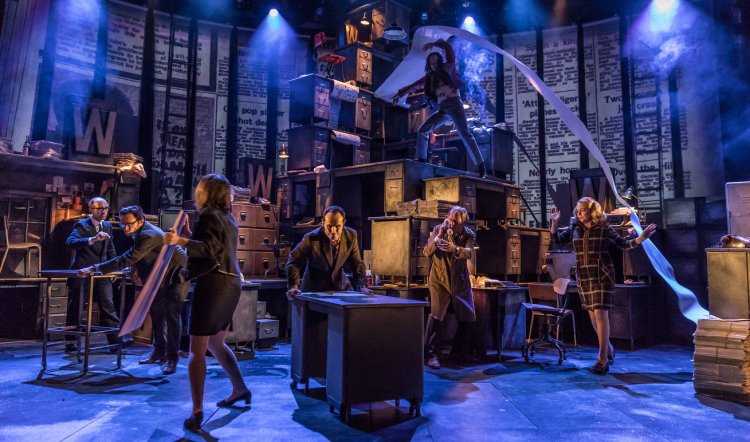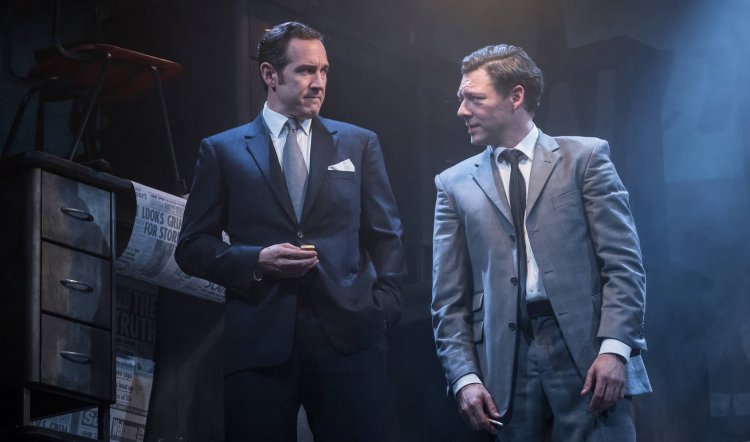
INK - LONDON
INK, Almeida Theatre, Islington, London, to 31 July 2017. Photography by Marc Brenner, above: Bunny Christie’s set; below - Bertie Carvel and Richard Coyle
BY CAROLINE BAUM
After seeing the Aussie Hamlet at Glyndebourne, the Aussie summer in London continues with a new play about Rupert Murdoch.
In James Graham’s Ink, it’s 1969 and Murdoch (Bertie Carvel) is a brash young renegade outsider eager to upset the British establishment with a new kind of newspaper. To do so he needs a hungry editor with something to prove. He finds one in union man Larry Lamb (Richard Coyle), who takes over the newly-purchased The Sun and comes up with a tabloid that screams populist in every headline. They inch ever closer to overtaking the circulation of the Labour-leaning Daily Mirror whose autocratic boss, Hugh Cudlipp (David Schofield) was both his old employer and bellicose role model, and with whom he has a score to settle: it puts a fire in his belly.
Graham brings the flavour of the old Fleet Street to life and sets up the cutthroat dynamic of competition with engaging and entertaining momentum. In the first half of the play, the dialogue is pugnaciously witty and sharp as Lamb recruits his team of writers and editors and brainstorms story ideas. The pace gallops along, in a series of short scenes with much of the production’s energy coming from the staggeringly good set by Bunny Christie: a cubist mountain of filing cabinets and piles of newspapers, all inky surfaces and printing press grime. It steals the show in a scene which demonstrates the process of newspaper production when type was set by hand, climaxing in the pouring of molten metal. But Rupert Goold’s direction is often unnecessarily and distractingly showy and flashy; musical routines interrupt the action for no apparent reason and pad out a play that could do with a good trim.
In the second half the mood darkens considerably, focussing on the case of the kidnapping of the wife of a Sun executive. Muriel Mackay was snatched from her home in a case of tragic mistaken identity kidnapping, when criminals were after Rupert’s wife Anna. Because the story is so closely linked to the Sun, the paper has the scoop on it, and circulation soars. But can Lamb justify the morality of exploiting his colleague’s personal tragedy to boost readership?

In a sometimes clumsy and gauche piece of writing that turns the mood sombre, Graham conflates Lamb’s moral decline with his decision to initiate “the page three girl” all pouty and naked, as if the two things – the conscious advantage of having inside knowledge of a murder before the rest of “the street”, and exposing a pair of tits – are one and the same. The play falters here and suddenly one wishes one were watching David Hare’s far more savage Pravda. Only one line sent a veritable chill through my bones when Murdoch, speaking about the unions that might object to his new methods says, foreshadowing the Wapping era, “I will end them.”
The other problem with the production is the crucial casting of Bertie Carvel as Murdoch. He plays him as if he were auditioning for the part of Richard lll, stooping and grimacing. But Carvel lacks the necessary charisma to convince us that he is a serious threat to the status quo and is no match for the robust and utterly convincing Richard Coyle as Lamb.
Still, the play does not moralise or lecture, or take a predictable stance, and is a refreshing reminder of just how much of a rebel Murdoch was before he became part of the Establishment he wanted to tear down.



